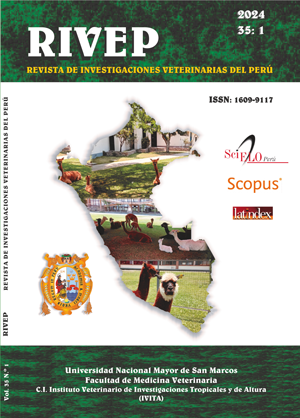Pet ownership and knowledge of zoonoses in Bambamarca (Cajamarca, Peru)
DOI:
https://doi.org/10.15381/rivep.v35i1.27380Keywords:
responsible animal ownership, public health, zoonosis, CajamarcaAbstract
The aim of this study was to describe the ownership of pets and knowledge of zoonoses among residents in the district of Bambamarca – Cajamarca, Peru, in 2022. In total, 394 surveys were carried out, 30.5% in the urban area (Bambamarca city) and 69.5% in the rural area (Llaucán, San Juan de Lacamaca, Chala and El Tuco). Of those surveyed, 54.8% were female, 20.8% had completed secondary school and the average age was 39.9 years. Besides, 58.4 and 35.5% of interviewees claimed to own dogs and cats, respectively. The person: dog ratio was 4:1 and person: cat was 6.7: 1; 45.2% of dog owners raised them as pets and 45% of cat owners raised them as rodent pest controllers; 67.9% of the dogs were males and 50.5% of the cats were females. The rate of sterilized animals was less than 4% in both species. In the case of dogs, 54.1% walked without restriction and 31.7% of cats were classified as “outdoor”; 50.3% of dog owners and 69.5% of cat owners mentioned performing internal deworming, and 45 and 61.5%, respectively, performed external deworming on a regular basis (at least every 3 months). Moreover, 58% of dogs and 12.8% of cats were reported to have been vaccinated against rabies in the last year. Ignorance of the meaning of the term zoonosis reached 95.4% of those surveyed; however, 90.4% said they knew that animals could transmit diseases to people, the most recognized being rabies (69.8%). It is concluded that it is necessary to develop health education campaigns so that pet owners develop responsible ownership and thus avoid negative impacts on public health and animal welfare.
Downloads
Downloads
Published
Issue
Section
License
Copyright (c) 2024 Daphne León C., Néstor Falcón P., Cristhy Plasencia T.

This work is licensed under a Creative Commons Attribution 4.0 International License.
AUTHORS RETAIN THEIR RIGHTS:
a. Authors retain their trade mark rights and patent, and also on any process or procedure described in the article.
b. Authors retain their right to share, copy, distribute, perform and publicly communicate their article (eg, to place their article in an institutional repository or publish it in a book), with an acknowledgment of its initial publication in the Revista de Investigaciones Veterinarias del Perú (RIVEP).
c. Authors retain theirs right to make a subsequent publication of their work, to use the article or any part thereof (eg a compilation of his papers, lecture notes, thesis, or a book), always indicating the source of publication (the originator of the work, journal, volume, number and date).










